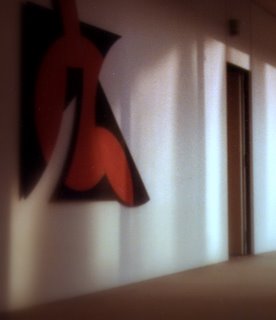
I hope eventually to add some retrospective thoughts on this page. But here's a first - and evolving - draft.
I sometimes feel that people archive the wrong things. Rarely is a radio or a TV programme interesting years later for the reasons its producers originally intended. But what often is interesting in retrospect is the way people talked, how they formed sentences, what accents were like. Watching television archive footage, my eye is often drawn to the peripherals - how people dressed, how they carried themselves, the stories their bodies told, as distinct from what they said.
Because I have spent so much of my life following other people's personal stories, I've started to set down some of my own, here and elsewhere. It's my reaction to the horror that if something can't be Googled that it is, so to speak, pre-historic and beyond the reach of memory. On that trip to Canada with Rodney, I was struck by the phrase 'Je me souviens' ("I remind myself", "I remember") which appears on every car registration plate in Quebec. For Quebecers, the remembrance is of their French heritage. A wonderful Irishman who helped us during our trip there, and whose name I've forgotten, rendered the phrase in Hiberno-English: "Do we remember? Do we ever forget."
How much of the work we did thirty years ago mattered in the long run? I really don't know. Perhaps there was only one series that signalled a decisive social shift and that was Clare Duignan and Marian Finucane's Women Today. Irish language and music were a special case. Producers such as Proinsias O'Conluain and Padraic Dolan were witnesses to a culture whose survival then, and even more now, was in question.
Over the years I've spent many hours in archives listening to and watching old programmes. The one thing I've learnt is that the 'good old days' usually weren't; that programmes weren't as special as you remembered them; and that their production values can make one wince in retrospect. There are rare exceptions - only one or two that I can remember vividly. But this is not to say that many of the programmes were bad; they were probably very apt to their time and it is dangerous to judge them out of time.
What I do remember is, that, in that glad confident morning, a group of us, young men and women, had the high privilege of nudging the Irish conversation along, and that managers like Michael Littleton trusted us to make our own good - and sometimes bad - judgements. I don't think I could have given a lifetime to the work - nonetheless a lifetime was shaped by it. The experience had urgency for us then and, to me, it seems a sacramental act to remember it.
Relevant links
Eoghan Harris on Jim Plunkett
Losing their day jobs: the Radio Eireann Players as a permanent repertory company. Monograph by Eileen Morgan-Zayachek.



No comments:
Post a Comment